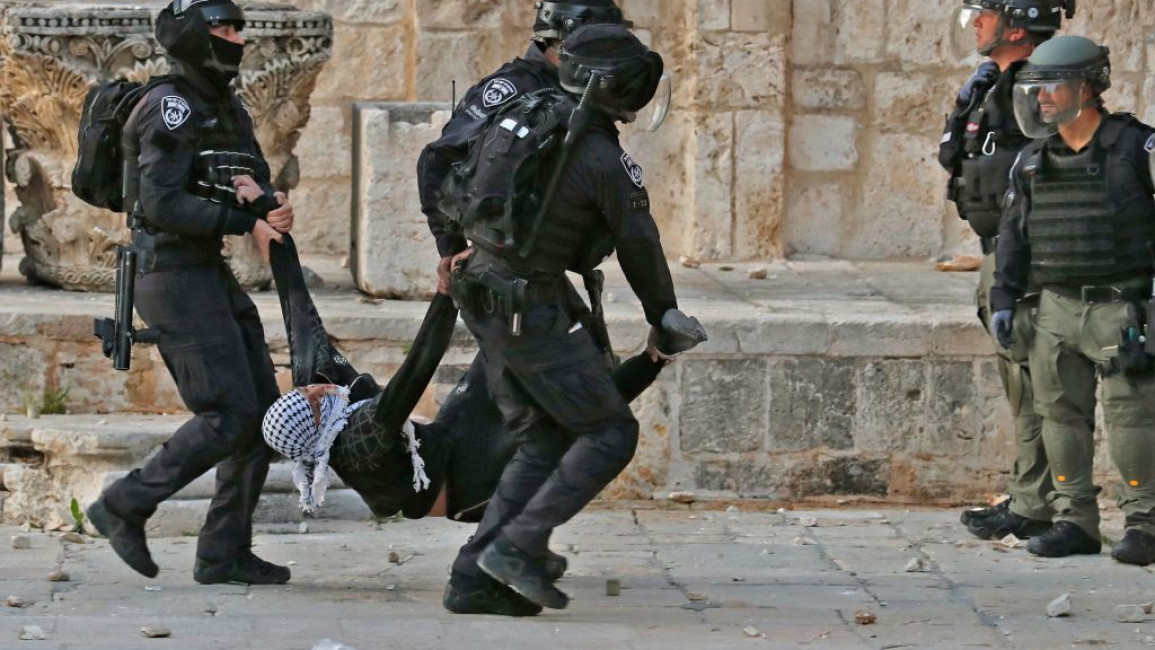UN 'deeply concerned' as Israeli raid on Al-Aqsa leaves dozens of Palestinians wounded
Israeli police wounded dozens of Palestinian protesters on Friday in their latest raid on the Al-Aqsa Mosque compound in Jerusalem, as the United Nations voiced deep concern at spiralling unrest.
And in the Gaza Strip, militants fired rockets at Israel for the third time in as many days, as tensions threatened to erupt into an all-out escalation.
The Palestinian Red Crescent said that 57 people were wounded, including 14 Palestinians taken to hospital, at least one of them in a serious condition, after Israeli forces stormed the compound in Israeli-annexed east Jerusalem's Old City.
The violence has sparked international fears of conflict, one year on since similar raids by Israel led to an 11-day war between Israel and Gaza-based militants.
The escalating unrest prompted concern at the United Nations, which demanded a probe into the Israeli police actions.
"We are deeply concerned by the escalating violence in the occupied Palestinian territory and Israel over the past month," said Ravina Shamdasani, spokeswoman for the UN Office of the High Commissioner for Human Rights.
"The use of force by Israeli police resulting in widespread injuries among worshippers and staff in and around the Al-Aqsa mosque compound must be promptly, impartially, independently and transparently investigated," Shamdasani said.
Al-Aqsa is Islam's third-holiest site, and the most sacred site in Judaism where it is known as the Temple Mount.
Israeli police said Palestinians began hurling stones before dawn Friday towards the Western Wall, the holiest site where Jews can pray.
Police fired tear gas and rubber-tipped bullets at stone-throwing Palestinian youths, an AFP photographer said.
One Palestinian man suffered a head wound and was taken to Jerusalem's Hadassah hospital, where a spokeswoman told AFP he was in "very serious condition".
Police used drones to spray tear gas from the air, AFP reporters said.
More than 200 people, mostly Palestinians, have been hurt in and Israeli raids around Al-Aqsa in the past week.
Palestinians have been outraged by massive Israeli police deployment and repeated visits by Jewish extremists to the holy site.
By long-standing convention, Jews are allowed to visit under certain conditions but are not allowed to pray there.
On Thursday, Arab ministers meeting in Jordan -- custodian of east Jerusalem's holy sites -- denounced "Israeli attacks and violations against worshippers" at Al-Aqsa, branding them "a blatant provocation to the feelings of Muslims everywhere".
The latest spike in violence, including four deadly attacks since March 22 inside Israel carried out by Palestinians and Palestinian citizens of Israel, have claimed 14 lives.
Over the same period, 24 Palestinians have been killed, including assailants who targeted Israelis, according to an AFP tally.
Among them is Ibrahim Labdy, 20, from Jenin, who died on Friday from wounds sustained during an Israeli raid on the city last week.
Violence has also surged this week in the Gaza Strip coastal enclave run by the Islamist Palestinian movement Hamas, where crowds rallied on Friday in solidarity with those in Al-Aqsa.
Hours later, Palestinian militants in Gaza fired two rockets at Israel, with one hitting "an open field near the border fence with northern Gaza" and the other landing "inside the (Gaza) Strip," the Israeli army said on Twitter.
One person was lightly injured in Gaza after a rocket hit next to his house, a witness said.
On Thursday, Gaza militants and Israeli warplanes exchanged fire in the biggest escalation in months.
After a rocket fired by militants hit the garden of a house in southern Israel late Wednesday -- the first such attack since January -- Israel launched air strikes against Gaza.
The military said it had hit an underground rocket factory, prompting another volley of rockets from Gaza.
Hamas spokesman Fawzi Barhoum said the movement was "determined to continue the struggle... no matter the sacrifices".
The violence has proved a political headache for Israeli Prime Minster Naftali Bennett, who leads an ideologically divided coalition government.
After losing its one-seat majority in parliament earlier this month, the Raam party, drawn from the country's Arab minority, suspended its support for the coalition over clashes at Al-Aqsa.


![President Pezeshkian has denounced Israel's attacks on Lebanon [Getty]](/sites/default/files/styles/image_684x385/public/2173482924.jpeg?h=a5f2f23a&itok=q3evVtko)



 Follow the Middle East's top stories in English at The New Arab on Google News
Follow the Middle East's top stories in English at The New Arab on Google News


